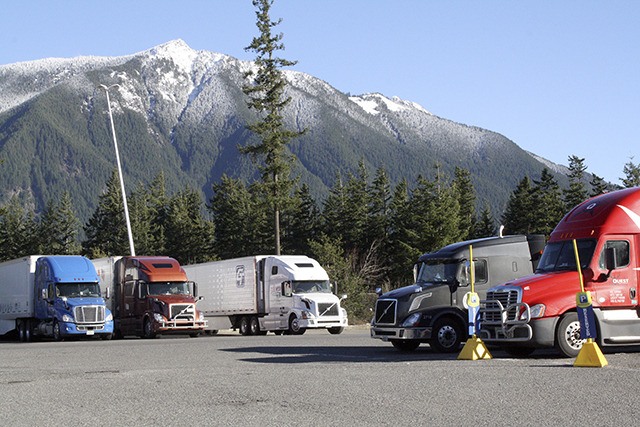No new truck stops are allowed in North Bend, nor will the existing one, off Exit 34, be permitted to expand in size, pending a vote by the North Bend City Council in the near future.
The city has maintained an interim ban on new truck stops since 2014, but will soon receive a unanimous recommendation from the advisory planning commission to make the interim code change, approved by the council as Ordinance 1523 on April 14, 2014, permanent.
Planning Commission members voted on the issue, which commission chairperson Gary Fancher said was one of the group’s “most active topics,” on Feb. 11, with more than 80 people attending the public hearing to speak on the issue, or providing written testimony.
The recommended amendments to North Bend Municipal Code 18.06.030 and 18.10.025 will prohibit a new commercial truck center/service area and prohibit the expansion of Truck Town site, but not affect its current operations.
One of the actions that prompted the interim code change and further planning commission review was a staff report at a July 23, 2013, city council work session that Puget Western had started a discussion with the city on developing a 12-acre site, adjacent to Truck Town, into a new truck stop.
North Bend City Councilors have been very vocal in recent years regarding the city’s need to be included in regional freight planning conversations, and equally vocal in their frustration at the state’s, county’s and port of Seattle’s unresponsiveness. Truck Town is the only commercial truck center in King County.
The interim code was effective for only six months and had to be renewed by a council vote several times, because the planning commission was unable to address the truck stop issue until recently. In December, the commission completed work on the city’s required comprehensive plan update and Fancher said that their work on the update also influenced their review of the truck stop code amendments.
“We really took the time to discuss strategy (on the comprehensive plan),” Fancher said. “We wanted information on the breakdown of housing types, low-density vs. high-density, we looked at employment and capacity… we reached far and wide to make sure we had the right mix.”
In their review of the code amendments on truck stops, they also considered, from the city’s vision statement, “the importance of being a premier outdoor recreation destination.” Truck stops, according to the city council’s agenda bills on the interim code change, “provide little economic benefit to the city and continue to have significant adverse impacts to traffic, air quality and city infrastructure.”
Fancher said the group also looked at the underlying code of that property, Employment Park 2.
“If you look at the language of what the EP-2 code is, it really talks about more of a harmonious business to the community,” he said.
Truck traffic has been an ongoing issue in North Bend, and a source of frustration for many residents, particularly when Snoqualmie Pass is closed and trucks, with nowhere to go, overflow the truck stop and find parking wherever they can.
While a solution is needed, Fancher said, the 12-acre site of a proposed new truck center would not be enough for the current, or future needs. Truck Town is 15.5 acres, and “I understood from our city administrator that they have 140 spaces and frequently park more,” Fancher said.
An additional 12 acres of truck parking would provide only about 100 more spaces.
Meanwhile, truck traffic continues to increase throughout the area. The Puget Sound Regional Council projected that freight traffic will nearly double in volume by 2040.
The vote, Fancher said, “is not a vote against trucking… and voting for this does not mean the work is done.”
Instead, he said, it’s supporting the city in its goals for long term viability and a statement that North Bend can’t be solely responsible for the demands of the freight industry in King County.
“We can take on some of the need, but someone else has to take on an additional part of the need,” Fancher said. “Those are the larger discussions that need to happen, but not at the North Bend community level.”
The planning commission’s recommendations will be presented to the North Bend City Council for a final vote at a meeting some time in the next few months.
Since the commission held a public hearing on the issue, the council is not required to hold another public hearing, Mayor Ken Hearing said, but public testimony is always taken at meetings.


